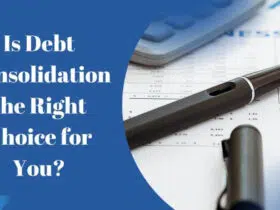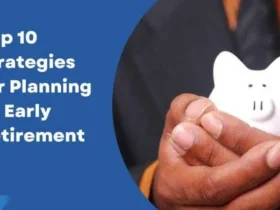Debt consolidation is an effective refinancing method to reduce the financial burden for people swamped with multiple loan liabilities and credit card debt. It allows you to reorganize your debt and make it easier to manage your finances. Through debt consolidation, you can combine various high-interest debts from numerous creditors into a single loan with one monthly payment and likely a reduced interest rate.
A high credit score helps if you want to get your loan approved with better terms. However, there any many financial solutions for people with bad credit scores. If you are looking for an auto loan, personal loan, bad credit loan, or want to consolidate debt, here is a good online resource to get the funds you need according to your current financial situation.
How does debt consolidation work?
You would repay all your existing debts through funds from a debt consolidation loan. Over time you would pay the debt consolation loan, which comes with a lower interest rate and one monthly payment.
For a debt consolation loan, you can opt for an unsecured loan such as a personal loan and credit card with 0 percent APR. Generally, lenders check your credit score, debt-to-income (DTI) ratio, and sources of income when deciding if you qualify and set your interest rate.
Fixed-rate Personal loan: The personal loan would allow you to clear your existing debt from multiple creditors. You can pay back the loan in a single monthly payment over a period of time. You can get a better interest rate with a slightly fair credit score. In general, the higher the credit score, the lower the interest rates. The size and term of the loan can also affect the interest rate.
Balance-transfer credit card with 0% APR: If you have a good credit score, you can apply for a zero percent interest credit card. Transfer all other credit card debts to this credit card. Instead of paying a higher interest rate on all other cards, you would pay a lower interest rate, given that you use the offer to pay on time.
To get secured loans, you have to put down your assets as collateral, for example, a home equity loan with your home as a guarantee for creditors. You can also choose a 401(k) loan. If you can’t repay the loan, this can be risky to your home or retirement plan. The loan terms would depend on your credit score and financial repaying capability as per your debt-to-income ratio.
When applying for a debt consolidation loan, you will need your Social Security number and contact information, an estimate of your monthly debt obligations, and a pay stub and employer information to prove income.
Getting pre-approved for a loan is one way to ensure you get the lowest possible interest rate. It requires a soft credit pull, which won’t affect your credit score. You can check your credit scores at AnnualCreditReport.com.
Benefits of debt consolidation
Debt consolidation allows you to save money and make it easier to manage your debt. Debt consolidation is a suitable option for you in the following circumstances.
- Your credit score is good enough (mid 600s) to qualify for a 0% credit card or low-interest debt consolidation loan. Taking advantage of debt consolidation is ideal if your total monthly dues, including rent or mortgage payments, are less than half of your monthly cash inflows to cover loan repayments.
- You qualify for a lower interest rate on a debt consolidation loan and can save thousands of dollars in interest. For example, instead of paying five creditors at interest rates ranging from 15% to 25%, you can use a debt consolidation loan to pay the same amount at a 7% interest rate. This makes paying off your dues affordable. It would save you from accruing more interest than the initial principal.
- You have a specific date in mind when you want to be debt free. The repayment timeline gets longer as you make the minimum payment on your credit cards. A debt consolidation plan brings you closer to being debt free quickly. Debt consolidation loans have a fixed installment schedule, so you can calculate the exact date you would be debt free.
- You don’t want to juggle multiple monthly payments. Debt consolidation would allow you to make only one monthly payment on the same due date every month instead of the hassle of managing and repaying multiple debts distributed throughout the month among different creditors.
- You have the financial discipline to not fall into the temptation of getting into more debt by resisting avoidable purchases.
The downside of a debt consolidation
Debt consolidation is a good choice if you want to save money and organize your monthly payments. Debt consolidation may not be right for you if the below circumstances apply to you.
- Your debt burden is so large that even with reduced interest rates, you can’t afford to pay it back in the foreseeable future.
- Your debt is small, and you can see yourself being debt free within a couple of months to a year by continuing to make existing payments. The debt consolidation wouldn’t help you the same much to be worth it.
- You don’t qualify for lower interest rates than what you pay on original debt due to a low credit score or debt-to-income (DTI) ratio. Your interest can also shoot up if you pay lower monthly payments towards a debt consolidation loan over a longer period.
- You don’t want to pay additional fees lenders charge for debt consolidation loans, such as application fees, origination fees, prepayment penalties, annual fees, balance transfer fees, etc. You need to check for these upfront costs before applying for the loan.
- Taking another loan may not be a good idea if you still struggle to maintain sound money management habits. It is easy to fall into an endless debt spiral if you can be easily tempted to spend the money you don’t have on things you can’t afford.
Debt consolidation can help you manage your finances better and pave the way to being debt free quickly. To make financial sense, you must thoroughly understand your debts and income generation sources for debt consolidation to work. If you regularly spend more than you can afford, you must be smart about your budget and spending habits.

Hunaid Germanwala is a digital marketer and content creator at Health Products For You since 2014. He has an MS from Ulm University in Germany. His mind is always buzzing with creative ideas and is eager to explore new perspectives. His motto in life is “Better to Light the Candle than to Curse the Darkness.”














Leave a Reply